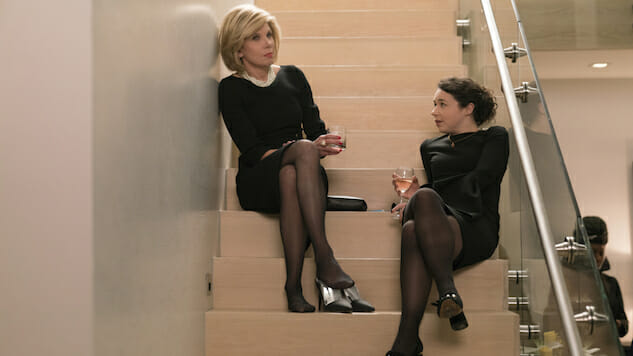The Good Fight Is Game for Anything, and That’s Why It’s So Damn Fun
Photo: Patrick Harbron/CBS
In the new season of Horny Legal Battle—er, sorry, The Good Fight—assistant U.S. attorney Liz Reddick-Lawrence (Audra McDonald), in hot water after a tweet calling President Trump a white supremacist, resigns her position by writing “I quit” on her father’s funeral program and handing it to her boss. Her soon-to-be colleague at Reddick, Boseman & Lockhart, Diane Lockhart (Christine Baranski), begins micro-dosing the psilocybin she scores from the reception’s barkeep. A pair of murders rocks Chicago’s white-glove firms, as does the first perpetrator’s command to “Kill all lawyers!” There are doctored recordings, dubious statements, reality TV stars, and at least one bounce house, which investigator-in-training Marissa Gold (scene-snatcher Sarah Steele) uses to strike up an important conversation. As Lucca Quinn (Cush Jumbo) says to her client and co-worker, Maia Rindell (Rose Leslie), referring to audio of the latter’s Ponzi-scheming, fed-fleeing father engaging in phone sex, “This is too obviously provocative. This was created to hurt you, to make you react.” Then again, this is a series in which the title sequence features only explosions, of gavels, laptops, handbags, decanters, telephones, and high-heeled pumps. In The Good Fight, there’s no such thing as “too obviously provocative.” There is only “just provocative enough.”
Despite the fact that it’s built around Maia’s involvement in the case against her father—Jane Lynch’s prosecutor spends much of the season premiere chirping at her silent quarry, before Maia, rather deliciously, uses the woman’s blazer to dry her hands—The Good Fight struggles, following the template set by The Good Wife, with effective serialization. (Remember Kalinda’s abusive ex? God, that subplot was awful.) But creators Michelle and Robert King and Phil Alden Robertson understand character, almost preternaturally so: The sight of Diane in the season’s second episode, angling for a client at a heating oil depot in a white fur and black sunglasses, says more about her—glamorous, but tenacious; elegant, but not (too) stuck up—than reams of dialogue ever could. The same goes for Marissa’s perfect invitation to Maia, from the third: “You can come to my house for Pesach this year,” she says, toeing the line between sly and sincere before tipping toward her usually arid wit. “We’ll even hide a few Easter eggs for you.”
That line is where The Good Fight locates its purest, giddiest ecstasies, leading those at my biweekly viewing parties to hoot and holler as if it were a football game, or a form of church. (For queers like me, a TV series that contains the come on, “I’m gay and like canning, too. We should meet up,” might as well be church, to be honest.) As with its predecessor, The Good Fight is a habit-forming blend of politics, pop culture, humor, and high tech rolled into the silky cigarette of a legal procedural, and it’s the fact that none of these elements manages to dominate for long that seems to be the secret to the Kings’ inimitable recipe. In Season Two, for instance, the murders of two Chicago lawyers by their own clients sets Diane on edge—or is it the wider tumult of Trump’s presidency, which she still gawps at in disbelief 408, 415, 422 days in? The net tightens around Maia, threatening to send the series in a more solemn direction, and then her mother (played by Bernadette Peters) turns up in court claiming someone misheard “Vail” as “jail.” (Reader, I LOL’d.) Office politics come to the fore, supplanted by the always timely case of the week—in the third episode, it involves allegations of sexual assault on a reality show called Chicago Penthouse—supplanted in turn by an out-of-left-field twist, a semi-romantic detour, and some sharp TV criticism—The Good Wife’s “prestigious” punching bag, Darkness at Noon, enjoys an acerbic reprise—before returning, on the episode’s final beat, to office politics. It’s like that karaoke Wheel of Fortune that Justin Theroux’s character spins in The Leftovers, except the choices are all TV tropes and the player is a TV show: The Good Fight is game for anything, and that’s why it’s so damn fun.
-

-

-

-

-

-

-

-

-

-

-

-

-

-

-

-

-

-

-

-

-

-

-

-

-

-

-

-

-

-

-

-

-

-

-

-

-

-

-

-








































